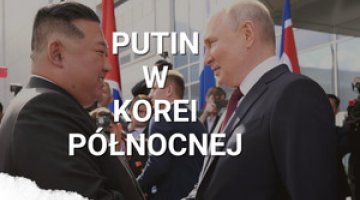Russia signs a military alliance with North Korea
Vladimir Putin paid an official visit to the Democratic People’s Republic of Korea (DPRK) on the 18 and 19 June. The Russian delegation included two deputy prime ministers (those responsible for the energy sector and the defence industry) and the ministers of defence, foreign affairs, transport and health, a deputy minister of defence, and the governor of Primorsky Krai, which borders China. Aside from Putin’s talks with the DPRK’s leader Kim Jong Un, the Russian delegation met in a plenary session with its North Korean counterparts. Three documents were signed: an inter-state treaty on a comprehensive strategic partnership and two inter-governmental agreements: one on the construction of a road bridge over the Tumen River, marking the border between the two states, and another on cooperation in health care, medical education and science.
The strategic partnership treaty contains a commitment to immediately provide “military and other aid using all the available forces”, in line with Article 51 of the Charter of the United Nations, to the other party when it is in a state of war resulting from armed aggression. Additionally, it obliges the parties to refrain from signing agreements with third countries that could violate the sovereignty and security of the other signatory, and provides for joint actions aimed at enhancing both states’ defence capabilities. The document commits the Russian Federation and the DPRK to boost trade, create favourable conditions for economic cooperation in fields such as customs and finance, and to bolster mutual investment initiatives. Putin used both his visit and an article published the preceding day in a North Korean daily newspaper to express his gratitude for the support North Korea has offered Russia in its war against Ukraine, to show appreciation for Pyongyang’s anti-American policy and blamed the US alone for the tensions in the Korean Peninsula. He announced that Moscow opposes the UN’s plan to prolong its sanctions regime against the DPRK.
Commentary
-
The signing of the strategic partnership treaty, in particular the decision to include a provision on mutual military aid in the event of aggression, carries serious consequences. It will lead to a more intensive military-technical cooperation, which will undoubtedly translate into increased supplies of North Korean equipment and ammunition for the Russian military fighting in Ukraine. This conclusion is supported by the presence in Russia’s delegation of a deputy prime minister responsible for the defence industry, as well as the defence minister and deputy defence minister responsible for military procurement. Furthermore, the treaty suggests that Russia will support the technological upgrade of the North Korean military, especially its rocket, space and, most likely, nuclear components. This will increase the military threat to South Korea and to the US troops stationed there (the US is bound by a defence alliance with South Korea). Moreover, it can be assumed that a military alliance with Russia will encourage the North Korean regime to escalate tensions and increase its readiness to launch actions which could provoke a full-scale conflict in the Korean Peninsula. The signing of this document indicates that Moscow believes that it would benefit from an outbreak of such a conflict or is at least willing to accept the risk of it happening.
-
The agreement should also be viewed as a move corroborating the Kremlin’s radical shift from the West towards Asia, not only in the field of foreign policy, but also in matters linked with shaping Russia’s identity. It is worth reminding in this context that the Russian Federation is the successor of an agreement the Soviet Union signed with the DPRK back in 1962, which also contained provisions regarding mutual military aid. However, Moscow renounced this provision in 1996. Even at the end of the 1990s, when Russian political establishment was already deeply disappointed with its relations with the West (its objection to NATO’s military intervention in Kosovo constituting a symbolic breakthrough), proposals regarding an anti-Western alliance with North Korea were voiced only in circles that were marginal politically and intellectually. Prior to Russia’s full-scale invasion of Ukraine in February 2022, Russian political discourse presented the DPRK as an example which Russia must not follow, even when it itself was in conflict with the West. Moscow’s increased cooperation with Pyongyang and the Kremlin’s accompanying rhetoric align perfectly with the ideological concept which Russia has been promoting, regarding its civilisational break with the Western tradition and efforts to build an anti-Western alliance of ‘traditional civilisations’.
-
The composition of the Russian delegation indicates that in practical terms the summit will result in enhanced cooperation in the military-technical, energy, and health care sectors and transport links expansion. It should be noted that Russia formally continues to respect the UN sanctions imposed on the DPRK. Thus, according to official figures, the value of trade between the two states is just $35 mn annually, although in 2022 it recorded a nine-fold increase and rose again by 50% in 2023. However, it should be assumed that the real value is much higher (this suspicion is indirectly corroborated by the fact that in 2023 Russia vetoed further existence of the UN experts’ group who monitored implementation of sanctions imposed on North Korea). It is certain that any prospective development of trade cooperation will be more important to North Korea than to Russia.
-
Moscow will use Putin’s visit to North Korea and the agreements signed during this trip as an instrument of political and psychological pressure targeting the West. This is because these developments create the threat of increased regional and global instability, and at the same time they serve to promote the view that North Korean resources will enable Russia to prolong its war against Ukraine or even contribute to the aggressor winning this war. Thus, they create additional pressure on the West to accept Moscow’s terms for ending the war against Ukraine. Moreover, these developments are meant to intimidate America’s Asian allies, that is Japan and most importantly South Korea, which directly or indirectly support Ukraine (politically, financially, by providing ammunition). This raises the cost of this policy and the risks linked with it.
-
Beijing’s restrained reaction to Moscow and Pyongyang concluding a strategic partnership treaty is significant. It should be assumed that Putin notified the Chinese leader of his intention to sign this document during his recent visit to Beijing in April. From China’s perspective, the consequences of this agreement are ambiguous. On the one hand, it will help Russia to wage its war in Ukraine and pose another problem to Washington, which is in Beijing’s interest. Nevertheless, the increased risk of escalation in the Korean Peninsula could provoke a full-scale conflict in northeast Asia, which could involve the United States. This, in turn, is a scenario which China currently wishes to avoid.




